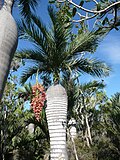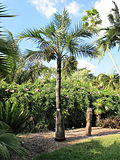Classification System: APG IV
Superregnum: Eukaryota
Regnum: Plantae
Cladus: Angiosperms
Cladus: Monocots
Cladus: Commelinids
Ordo: Arecales
Familia: Arecaceae
Subfamilia: Ceroxyloideae
Tribus: Cyclospatheae
Genus: Pseudophoenix
Species: P. ekmanii – P. lediniana – P. sargentii – P. vinifera
Name
Pseudophoenix H.Wendl. ex Sarg., Bot. Gaz. 11: 314. (1886)
Type species: Pseudophoenix sargentii H.Wendl. ex Sarg., Bot. Gaz. 11: 314. (1886)
Synonyms
Heterotypic
Sargentia H.Wendl. & Drude ex Salomon, Palmen: 160 (1887)
Cyclospathe O.F.Cook, Mem. Torrey Bot. Club 12: 25 (1902)
Chamaephoenix H.Wendl. ex Curtiss, Florida Farmer Fruit Grower 1(8): 57 (23 Feb. 1887), nom. illeg.
References
Wendland, H.A. 1886. Botanical Gazette 11(11): 314–315.
Govaerts, R. et al. 2018. Pseudophoenix in World Checklist of Selected Plant Families. The Board of Trustees of the Royal Botanic Gardens, Kew. Published online. Accessed: 2018 Dec. 14. Reference page.
International Plant Names Index. 2018. Pseudophoenix. Published online. Accessed: Dec. 14 2018.
Tropicos.org 2018. Pseudophoenix. Missouri Botanical Garden. Published online. Accessed: 14 Dec. 2018.
USDA, ARS, Germplasm Resources Information Network. Pseudophoenix in the Germplasm Resources Information Network (GRIN), U.S. Department of Agriculture Agricultural Research Service. Accessed: 08-Apr-12.
Pseudophoenix is a genus of palms which is native to the wider Caribbean. Three species of the four species are endemic to Hispaniola, while the fourth, P. sargentii, is widely distributed in the northern Caribbean (Greater Antilles, Windward Islands, Bahamas), Florida, and the Yucatán Peninsula (Belize and southeastern Mexico).[1][2][3][4][5]
Trees in this genus are medium to large palms with single, unclustered trunks. They lack spines and have pinnately compound leaves. Flowers are green and bisexual; the ripe fruit are red.[6]
Species
| Image | Name | Distribution |
|---|---|---|
 |
Pseudophoenix ekmanii | Barahona Peninsula and Isla Beata in the Dominican Republic |
 |
Pseudophoenix lediniana | Tiburon Peninsula in southwestern Haiti. |
 |
Pseudophoenix sargentii | northern Caribbean, eastern Mexico, and extreme southeast Atlantic Florida. |
 |
Pseudophoenix vinifera | Hispaniola. |
References
Kew World Checklist of Selected Plant Families
Govaerts, R. & Dransfield, J. (2005). World Checklist of Palms: 1-223. The Board of Trustees of the Royal Botanic Gardens, Kew.
Flora of North America, Pseudophoenix sargentii subsp. sargentii
Acevedo-Rodríguez, P. & Strong, M.T. (2005). Monocotyledons and Gymnosperms of Puerto Rico and the Virgin Islands. Contributions from the United States National Herbarium 52: 1-415.
Carnevali, G., J. L. Tapia-Muñoz, R. Duno de Stefano & I. M. Ramírez Morillo. 2010. Flora Ilustrada de la Peninsula Yucatán: Listado Florístico 1–326
Acevedo-Rodríguez, Pedro; Mark T. Strong (2005). "Monocots and Gymnosperms of Puerto Rico and the Virgin Islands". Contributions of the United States National Herbarium. 52: 1–405.
Retrieved from "http://en.wikipedia.org/"
All text is available under the terms of the GNU Free Documentation License

